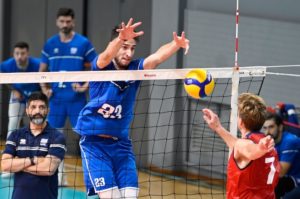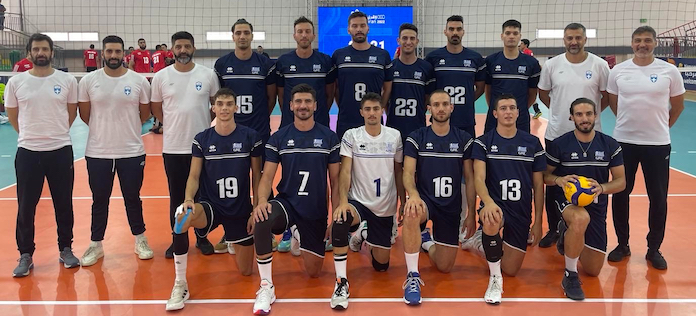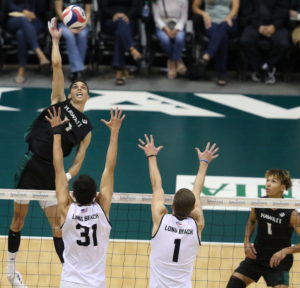Jim Wolf’s best photos from the UCLA-Long Beach volleyball title match
May 5, 2024
January 10, 2023
After Hawai’i won the NCAA men’s volleyball championship in 2021, coach Charlie Wade bid farewell to several key players, not the least of whom was national player of the year Rado Parapunov. Also gone were All-Big West first-teamers Colton Cowell, Gage Worsley and Pat Gasman.
So heading into 2022, the Rainbow Warriors obviously had a new look. That started with Greek imports Spyros Chakas and Dimitrios Mouchlias, who spearheaded Hawaii’s repeat by ranking 1-2 on the team in kills per set — Mouchlias at 3.59 and Chakas at 3.34 — then delivering clutch performances in the postseason.
Mouchlias, a 6-foot-6 opposite, had 16 kills and five blocks in the Big West title match, a sweep of Long Beach State. In the NCAA semifinal win over Ball State, he had 19 kills, five blocks and three aces. And in the title match, another sweep of Long Beach State, he had 11 kills.
Chakas, a 6-3 outside, had 16 kills in the conference final, 19 kills and 10 digs against Ball State — a match in which Hawaii rallied from a 2-1 deficit — and 14 kills, four digs and an ace in the NCAA championship. He earned NCAA Tournament MVP honors for his effort.

It was a quantum leap for both players, now juniors, who are the focus as the Rainbow Warriors head into 2023. They open the season Thursday and Friday at home against Ball State.
Chakas, who earned Big West all-freshman honors, played in just more than half of Hawai’i’s sets during the 2021 season and appeared only briefly during the national semis and finals. Mouchlias didn’t play at all in 2021 as he recovered from an injury.
Veteran UH coach Charlie Wade said after they spent time with the Greek national team,  “I noticed during (last) season, even on road trips and stuff, I would see those guys in the hotel weight room, and on campus I see them taking extra reps in the weight room and really working on getting stronger.
“They sent me some video of them with their senior national team over the summer (2021), and I noticed that they’re both hitting the ball harder, and they (were) better at scoring out of system … That’s one of the things they’ve really stepped up in their game is their out-of-system scoring.â€
Their development probably shouldn’t have come as a surprise. Both are volleyball lifers. Chakas’ father, Georgios, played professionally and later in rec leagues. Mouchlias’ father, Nikos, played for Greece’s Aris club team and later was an assistant with the national team, where his son and Chakas were under his tutelage.

Mouchlias and Chakas met when they were teenagers while playing in Greece’s junior national program, and it was Mouchlias, a year older, who first hatched the idea of playing college volleyball in the United States.
He said he saw a YouTube video of a Hawaii men’s match and thought it looked like “a really cool place to play.†Until then he didn’t even know volleyball existed in the U.S.
So he and his father did some research into getting an education and playing volleyball in America. As it turned out, Nikos Mouchlias knew Hawai’i assistant Milan Zarkovic from international playing and coaching circles.
Mouchlias said he also was considering a university in Canada, but a chat with Wade convinced him Hawaii was the right place. The transition, however, was not easy.
“I came here when I was 17. I didn’t know anyone here … and I really couldn’t speak English at all,†said Mouchlias, who hails from Soufli near Greece’s northeastern border with Turkey. “I thought I could (speak English), but when I came here and had a conversation with my teammate Chaz (Galloway) — he was my roommate — I was like, ‘Whoa. I cannot do that. I have to get better.’ â€
Through studying, reading his textbooks and daily conversations with classmates and teammates, Mouchlias slowly picked up English. His volleyball progressed, too. During his freshman season in 2020, he appeared in 13 of Hawaii’s 16 matches before the season was halted by the pandemic.
All the while, there was another obstacle Mouchlias was facing. Two months before the start of the season, he landed on a teammate during an exhibition match and suffered what he believed to be a sprained ankle. It “popped right back in,†so he didn’t think much of it.
He played through discomfort all season, but when he returned to Greece, he had it looked at by doctors there. To his shock, he had five fractures and two torn ligaments. He was told if he continued to play and injured it again, it could be career-ending, so he chose surgery.
He took a redshirt and was allowed to remain in Greece for that academic year.
That meant he was relegated to being a viewer while the Warriors captured the program’s first national championship (Hawai’i also won in 2002 but that title was vacated by the NCAA because of violations), with his good friend and then-freshman Chakas making a cameo appearance (two sets, no stats) in the win over BYU.
“I remember sitting in my living room with my father in Greece, and we were watching the final,†Mouchlias said. “As soon as they won, I was like, ‘I want to get (a title), too.’ â€
He at least could take some comfort in seeing his friend compete on the big stage. It was Mouchlias who planted the idea in Chakas’ head to join him in Manoa.
“I didn’t know about (playing in college in the USA) until my freshman year in high school,†said Chakas, who is from the Nea Smyrni community in Athens. “Dimi was already recruited by Milan and Charlie, so he was kind of the one who talked me into it, told me more details about it.
“I knew that in Greece, I didn’t want to go through the process of studying here because there’s a very long process of some exams when you finish high school, and it’s really hard. And it just wasn’t what I wanted to do. So I thought if I could combine studies and get a degree while playing volleyball at a good level, it was what I wanted to do.â€
Chakas seemed to have less trouble adjusting to the transition. Mouchlias said his friend had a much better grasp of English than he did. On the court, once Chakas started competing with Parapunov, Cowell and the others, he immediately recognized he would have to elevate his game.
That, he said, happened pretty quickly. But Chakas was not without his challenges. While he adapted well to the new surroundings, culture and competition, he found it difficult to adjust to the nuances of American volleyball.
“I kind of struggled a little bit with the mentality in the U.S.,†Chakas said. “It’s kind of different than Europe the way the stats are processed. There’s a difference in the perception to making an error and a mistake.
“For example, in the U.S., if you make a mistake on hitting on an attack, it counts toward your percentage. In Europe, it doesn’t count … It kind of got in my head my first year, but I was able to eliminate it last year.â€
Last year, playing together with the Warriors for the first time, was when the pair emerged. With Norwegian setter Jakob Thelle running the show, Chakas and Mouchlias blossomed.
Both are capable passers and can serve for a high percentage (they ranked second and third on the team in aces in 2022). For Chakas, Wade said, his passing skills held him back a little in the beginning, but now he has put the whole package together.
But attacking is their calling card. Wade said with both possessing quick jumps and quick arms, the Warriors were able to run a faster offense, and, combined with their improved ability to hit out of system, it made them more dangerous to opposing defenses.
“Everybody can score in system, and especially with as good as our setter is,†Wade said. “He can isolate everybody. But having the ability to score on your own, where everybody in the building knows where the ball is going and the defense is able to be well set and you still can score, that really is kind of next-level stuff.â€

And Chakas said he and Thelle have talked about trying to play even faster this season. Both men, along with Mouchlias, played over the summer for their national teams, and that, Chakas said, is where they saw they could up the tempo another notch.
Playing internationally, Chakas and Mouchlias agreed, helped immensely in raising their level. They competed in the 2022 Mediterranean Games, an Olympics-style competition, and in qualifications for the 2023 European championships. Greece went 6-0 in its pool — beating Thelle’s Norway squad twice — and advanced to the tournament, which will be held this summer in Israel.

“It was a great experience for me,†Chakas said. “It was what I wanted for the last two or three years, to achieve being on the men’s national team, the senior national team. The level was great. There were athletes who were way older than me, way more experienced. They were able to pass down knowledge and help different aspects of my game.â€
Added Mouchlias: “I am really humbled to represent my national team. It was my dream since I was a kid … I want to compete with all these guys, and I want to learn as much as possible. Every summer when I go back to Greece and work with the national team, I feel like I’m getting much more improved because you play with men who can be like 30 years old. It’s a different kind of volleyball.â€
But for Hawaii, the pair wants more of the same. The Warriors open the 2023 season looking to become the first team to win three titles in a row since UCLA won four four from 1981-84. And unlike last season, the bulk of the squad returns.
Besides Chakas, Mouchlias and Thelle, also back are lineup regulars Galloway, an outside hitter from San Diego; Brazilian middle Guilherme Voss; libero Brett Sheward, who hails from Newport Beach, California; Czech opposite Filip Hulmer; and middle/opposite Cole Hogland, a home-grown talent.

“I’m not going to lie to you: It (a three-peat) is, obviously, the goal for us,†Chakas said. “We know each other very well, and you can see that on the court as well. For example, last year, at this time of the year, we were kind of learning each other and trying to connect with each other.
“This fall it was way different … so I think that gives us a big advantage.â€
Added Mouchlias: “Being back with the whole starting lineup makes us so comfortable. I wouldn’t say the expectations are higher. We just want to win another one, of course, like we did before … We want another one as much as we did before.â€
And winning another one together would make it twice as sweet for the longtime friends.
“I remember Dimi having great nights on the national team, and I saw that last year, too,†Chakas said. “If you see many of the games last year, there were games I didn’t play well, and Dimi stepped up. There were games that Dimi didn’t play well, so I stepped up.â€
Said Mouchlias about last season, “We knew we had to prove ourselves to be in the lineup. We had our ups and downs, of course, but by the end of the season, we were so locked in and in a zone. I was so happy to see Spyros playing like that.â€
They will have two more seasons to chase championships together. Hawaii was picked to defend its Big West crown and likely will be among the favorites to take the NCAA title.
Chakas and Mouchlias will play no small role in whatever success the Warriors achieve, and Wade couldn’t be happier with his Greek godsends.
“At the end, they’re really wonderful young men and really good students,†he said. “They take their craft really seriously and look to have long futures playing volleyball, there’s no question.â€